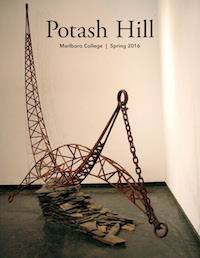Anthropology professor Nelli Sargsyan, who also joined the faculty in the fall, was drawn to Marlboro because of its close-knit and egalitarian community, in which she appreciates “the horizontality of structure.” She was impressed that there were engaged students on the search committee that interviewed her, and that people really know each other and make decisions together. Coming from a larger school, she also likes that Marlboro is still focusing on the liberal arts, not on vocational training.
“Marlboro allows space for exploring and thinking, which I really appreciate,” Nelli says. “The classes are small enough that you can engage in meaningful discussions with the students, and they have the freedom to go in directions that interest them.” She feels very aligned with the way writing and critical thinking are so crucial to Marlboro’s academic approach, and with the multidisciplinary nature of the learning environment.
“Here I am limited only by my imagination, in terms of the classes that I could teach, which is both overwhelming and really exciting,” she says. “It seems like Marlboro allows thinking across disciplines to happen very organically, among colleagues and also in response to students’ interests.” This semester she is teaching a course with photography professor John Willis that incorporates visual anthropology and social justice issues, and she looks forward to collaborating with other faculty across disciplines.
Originally from Armenia, Nelli received her bachelor’s degree from Yerevan State Institute of Foreign Languages, then her master’s and doctoral degrees in anthropology from State University of New York at Albany. She has taught in diverse college settings, from Yerevan State Linguistic University, in Armenia, to SUNY Albany, but she has never encountered the concentration of critically thinking students that she finds at Marlboro.
“It seems like the students who come to Marlboro are interested in posing the kinds of questions that I am interested in as well, re-examining certain social institutions or understandings of concepts and how these things operate in our lives. So that’s very exciting for me. I want students to be demanding of me, to make me do more intellectual work, question things, and push in directions that I haven’t explored, that we can engage in together.”
To Nelli, the goal of her classes at Marlboro is to help students think as anthropologists, with an awareness of our shared humanity and sensitivity to how lives and experiences are situated.
“Thinking like an anthropologist is being aware of this common humanity that we all have, of the fact that we share much more despite our differences. At the same time, it is being aware that these differences contribute to the flavor, the music, the color, and the texture of the human experience that one has. I think an anthropological way of knowing allows you to learn a lot about yourself, and about things that have informed your own way of living. This, then, makes it possible to listen more compassionately to many human stories, of which yours is just one.”
Nelli approaches teaching as an opportunity for cultivating social agency, the human capacity to make decisions and act on them, by engaging students in process-based and active learning experiences. One of the ways her students do this is by developing self-awareness and reflexivity, locating themselves in their own research.
“It’s about being aware that our own perspectives are always informed by the experiences that we’ve gone through, and are going through, that everything is tied to one’s own story. Creating an environment of empathy, in our little learning community of a classroom, gives the space where agency becomes possible outside the classroom as well.”
As far as her own research, Nelli’s doctoral work examined how Armenian-identified individuals negotiate their gender, ethnic, and sexual difference in the U.S. and in Armenia. Her dissertation resulted in a number of conference papers and publications, including a chapter in the book Creoles, Diasporas and Cosmopolitanisms: The Creolization of Nations, Cultural Migrations, Global Languages and Literature.
“I was interested in what it means to be Armenian for people who live in the U.S. diaspora, and how people navigate what it means to be Armenian of a certain gender, of a certain sexuality, of a certain race and religion. I was also interested in queer art-activism in Armenia, and as a result now I’m more interested in social movements in general.” Nelli looks forward to collaborating with Marlboro students on a field research project in this area.
Nelli considers Marlboro the perfect size, in terms of a functional community. When she visited the studio of ceramics professor Roberto Lugo, to make a bowl for the Empty Bowls Benefit Dinner, it occurred to her that her daughter’s elementary school class could help decorate some of the bowls. Rob said, “Yeah, sure.” Nelli talked to her daughter’s teacher, and, a week after Rob’s “Yeah, sure,” the primary class of Marlboro Elementary School was there in the studio, enriching the college campus with their energy and ensuring the bowl-making effort’s success.
“Just the ease with which things like that can happen is very significant to me,” says Nelli. “So besides the meaningful interdisciplinary collaborations, on a community level there’s this gentleness and connection that I appreciate.”

